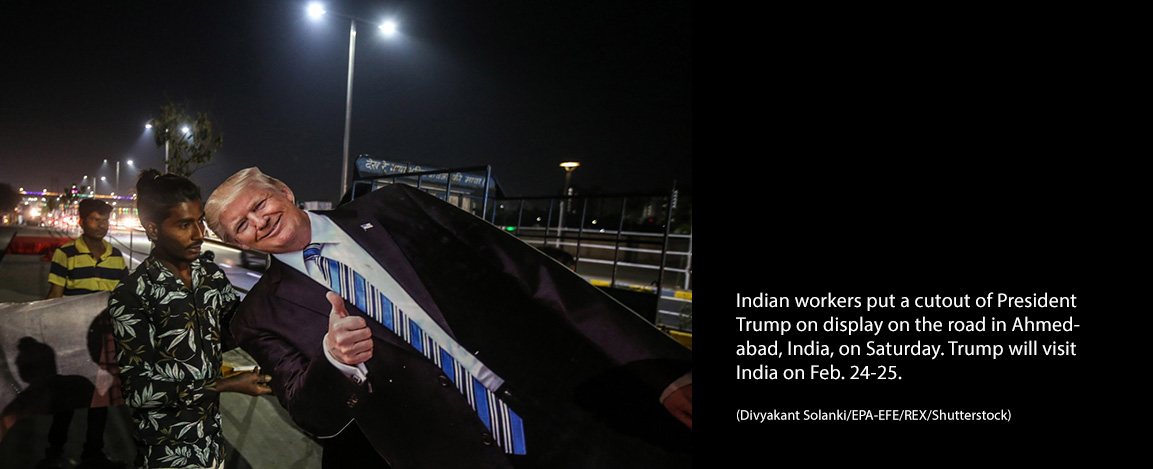In the past two decades, every US president has gone to India at least once, with Trump continuing that trend. This article was written by MIT PhD alumnus Christopher Clary and first appeared in the Washington Post.
President Donald Trump heads to India on Feb 24-25, making stops in New Delhi as well as Ahmedabad, in Indian Prime Minister Narendra Modi's home state of Gujarat. This will be Trump's first visit to India as president.
Trump has already raised expectations for his visit by reporting that Modi expects 5 to 7 million people will line the streets for a "Namaste Trump" welcome in Gujarat. Those numbers seem wildly inflated, and perhaps reflect a translation error. But Modi will no doubt deliver a large crowd to greet the president. The Indian public generally views Trump and the United States favorably—more so than other US partners.
Trump has elevated US-India ties
Before 2000, only three US presidents—Eisenhower, Nixon and Carter&mdashhad ever visited India. In the past two decades, every US president has gone to India at least once, with Trump continuing that trend.
India plays a principal role in the US Asia strategy—the Trump administration even renamed the regional military command the US Indo-Pacific Command to reflect India's central status. US strategy documents call India a key partner to counter China's efforts to establish "Indo-Pacific regional hegemony."
Washington worries about India-Pakistan tensions
The success of the US.-India partnership has implications for both countries' grand strategy, and in the last year the relationship has struggled to manage a series of surprises and irritants. In February 2019, a terrorist attack in Kashmir killed over 40 Indian paramilitary troops. Modi authorized punitive airstrikes against a suspected terrorist training facility in Pakistan, with links to the group that claimed responsibility for the Kashmir attack.
Those airstrikes then triggered a round of Pakistani strikes, and an aerial dogfight where an Indian pilot was shot down and captured by Pakistani forces. While Washington was sympathetic to India's need to retaliate to satiate public opinion, the fighting reportedly caused "consternation" in Washington, where the Trump administration felt it had to divert its attention away from other foreign policy problems. The episode did not appear to worry Indian voters—who overwhelmingly re-elected Modi and his party in May 2019.
US-Pakistan ties irritate India
Since that crisis, US-Pakistan relations appeared to improve while US-India relations have drifted. Washington's ties with Islamabad have long frustrated Indian decision-makers, who believe US aid and diplomatic protection enable Pakistan's support of violent nonstate groups.
U.S. officials have often relied on Pakistan's help on a number of regional issues, and have been willing to overlook Pakistani bad behavior, in exchange. In the last year, Pakistan has assisted in the Afghan peace process, and taken modest steps against terrorist groups operating within Pakistan. Trump and Pakistan Prime Minister Imran Khan have met several times in the past six months, forging an apparent bonhomie.
These steps have generated some successes for Pakistan. Trump has repeatedly offered US help on resolving the Kashmir situation despite India reiterating that US help is not desired. Moreover, Washington has somewhat relaxed its aid restrictions on Pakistan and appears to have prevented stricter financial sanctions despite Pakistan's lackluster record on money laundering and terrorism financing.
The US has concerns about India's moves since August
India's ability to isolate Pakistan internationally may have suffered a further blow following New Delhi's controversial decision in August to change Kashmir's status under the Indian constitution. New Delhi also restricted communications in Kashmir, prohibited protests and detained senior Kashmiri political leaders—including past political partners to the ruling Bharatiya Janata Party.
These moves have generated concern within the U.S. executive branch and from members of Congress. To an influential—and bipartisan—group in the US, India's Kashmir steps, along with recent changes to India's citizenship laws, seem incompatible with India's secular traditions.
But trade concerns complicate the relationship
Trump's conviction that US trade partners take advantage of Washington also has impinged on US-India ties. Trump picked a fight on Twitter with Modi over trade issues immediately before last summer's G-20 summit in Osaka, Japan—and US and Indian negotiators failed to reach a trade agreement before Modi's visit to the United States last September.
Trump has promised a big trade deal—but the target date seems to have slipped further, and US Trade Representative Robert Lighthizer reportedly canceled his planned visit to New Delhi. As progress on trade appears to have been deferred until after the US presidential election, the most concrete outcome of Trump's India visit may be the official announcement of long-rumored Indian purchases of US defense equipment, something that used to be routine but has slowed since 2017.
The Afghanistan peace agreement may overshadow Trump's India visit
A flurry of activity in recent days also suggests negotiators are close to reaching agreement on a partial withdrawal of US forces from Afghanistan, which the United States invaded in October 2001. While the United States has closely consulted with India as part of that process, there is no doubt that New Delhi is skeptical of the Taliban's open reemergence into Afghan political life, which likely would accompany such a deal.
This means Indian planners have to contemplate that an announcement on Afghanistan may well eclipse whatever occurs in New Delhi and Ahmedabad next week. While Indian analyst Sanjaya Baru has criticized Modi for having "perfected the art of diplomacy as mass entertainment," that is something that Trump knows how to do, too. If the president's team manages to sign a peace deal with the Taliban this month, then Modi's atmospherics may be eclipsed by Trump's desire to emerge as a historic peacemaker.
- - -
Christopher Clary is an assistant professor of political science at the University at Albany, State University of New York and a nonresident fellow with the South Asia program at the Stimson Center. He received his PhD in Political Science from MIT.




